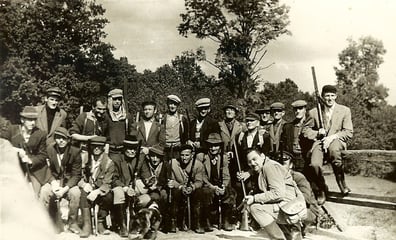In the final installment of our No Assembly Required Hiring series, we discuss the importance of having a strict and detailed onboarding process when bringing new sales talent into your organization.

For this segment, I thought it would be best to interview Anthony Cole Training Groups expert on hiring, Alex Cole-Murphy. We tricked Alex into leaving a great job at a recruiting firm to join ACTG and run our Hire Better Salespeople program. As part of that segment, Alex spends a great deal of time helping our clients onboard new salespeople into their organization.
Question 1: Alex, I’m sure there are many contributing factors to successfully onboard a new salesperson, regardless of experience. What would you say are the three most critical steps included in a successful onboarding program?
Answer: I would say that the three most critical steps in the onboarding process are:
-
- Using a sales-specific pre-hire assessment, like the one from Objective Management Group, as a training and development tool. The assessment helps to pinpoint some of the skill gaps that a new hire would need additional coaching and help with. It can save you a lot of time, energy and will help get the new producer up and running more quickly.
- Having strict, black-and-white goals and metrics to track. Specifically, a success formula that the new salesperson can live by and the manager overseeing that individual can hold them accountable.
- And lastly, weekly coaching and training focused on improving their sales skills and gaps in competencies (which you would identify using a pre-hire assessment). Most organizations know and understand that training around company policies, techniques, products, etc. is critical. But for the new hire to successfully sell for your business, problem areas within their sales process also need to be addressed.
Questions 2: Without the sales-specific pre-hire assessment information, how difficult would it be for anyone to effectively onboard a new hire? Additionally, without analytics like their personal Sales DNA or Will to Sell, what does the typical coaching look like or sound like between the manager and new hire?
Answer: The short answer is very difficult. Here’s why- all salespeople, regardless of experience, come with some gaps in skills or personal beliefs that impact their sales process. If you don’t know what those specific problem areas are, it becomes a matter of guessing, which is never effective. You could have hired a highly competent salesperson, but if you don’t know how to address and coach their weak spots, they will struggle to succeed in your business. The coaching that does take place when things like Sales DNA or Will to Sell aren’t available tends to be more general management. The manager or coach of this new hire will often listen to a problem, assume they know the exact cause based on their personal experience and correct the new salesperson in a “this is how it should be done” fashion. Eventually, the new hire and the sales manager become frustrated because very little progress is made. The job becomes much easier when you start with this information in front of you.
Question 3: You mentioned as one of your three factors the idea of having a goal that the salesperson owns and building a success formula to match. Tell me more about those two things and why it’s critical to successful onboarding.
Answer: The goals set for a new salesperson are often too general. Typically, success standards for a new hire can leave a lot up to interpretation. The common thought from a management perspective is “we’ll put these goals in place, but if they don’t hit them… Well, we’ll cross that bridge when we get there.” And that’s a dangerous, perpetuating cycle. That’s how you end up keeping unsuccessful salespeople on your team long after they should be let go. Having specific metrics in place lets everyone know right from the start that if certain things are incomplete after the first 90 days, the new hire has not been successful, and they will be penalized. It doesn’t have to be anything crazy; simple metrics like attending every sales meeting, completing all internal and product training within 90 days, making 50 calls a week, etc., should be considered non-negotiable. If they're unable to hit these standards, that gives you a pretty clear idea of what working with them for the long run is going to be like. Using a success formula helps you identify what those standards and metrics need to be.
Question 4: Every week, for a minimum of 13 weeks, you talk to and coach new hires. What I find interesting is that you schedule just 15 minutes each week. Our readership might be wondering, why 15 minutes and what can you possibly accomplish?
Answer: To start, 15 minutes is about 5 minutes beyond the attention span of the average salesperson. Anything much longer than that, and they start to lose focus and interest. My goal is to make our short time together as impactful as possible. We specifically focus on current opportunities in the pipeline and game planning for the next step with those prospects. I help them develop their process and pre-call plan, and we spend time roleplaying. I also listen for and refute excuse-making so we get to the real issues as quickly as possible. A coaching session that lasts more than 15-20 minutes is not going to be hugely effective as there is a lot of information for this person to digest and then try to implement. Biting off a piece at a time is going to be your best bet.
Question 5: In closing, what would you offer our readership, perhaps to help them improve the probability of success for future new hires?
Answer: I said it once, but it’s worth repeating- start by using a pre-hire assessment, preferably a sales-specific assessment. It will give you many of the details and analytics you need and provides you with a good roadmap for training and development. If you are interested in a tool like the one from Objective Management Group, click here or the button below for a free trial. Lastly, develop a plan and the success metrics we discussed earlier and commit to them! It will immediately start to positively impact your onboarding process and the success of your new hire.





